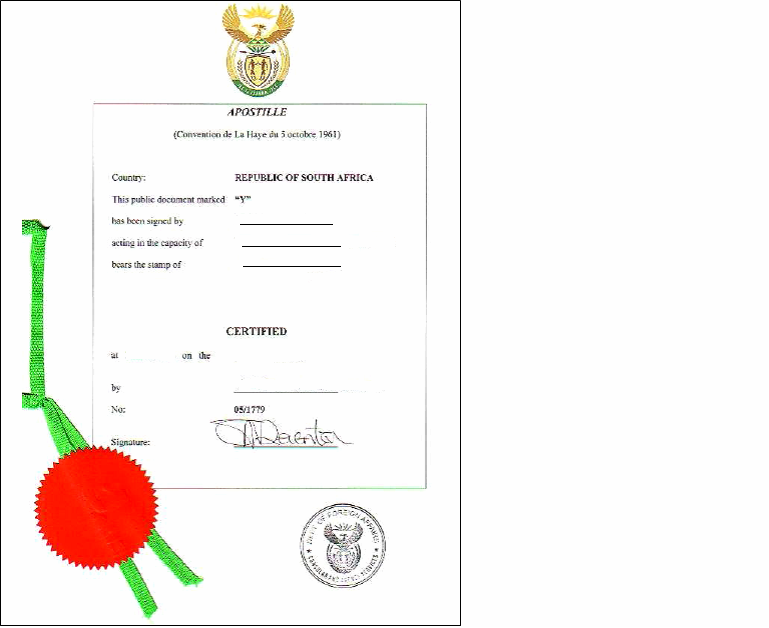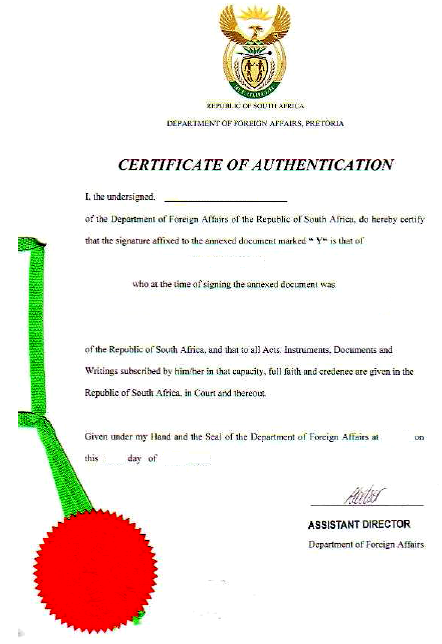1. Introduction
In order to circumvent this problem the High Court Act 59 of 1959 prescribes in Rule 63 of the High Court Rules of Court (hereinafter referred to as rule 63) the formalities to be complied with regarding documents which have been signed outside of South Africa.
Like South Africa, other countries also have legal systems prescribing formalities which must be complied with regarding such documents. It is to be anticipated that the inherent diversity of the respective different legal systems resulted in a complicated chain of authentication procedures, constituting it its entirety the legalisation of foreign documents (foreign documents to be interpreted as documents signed outside the borders of a country for use within such country). With The Hague Convention of 5 October 1961 Abolishing the Requirement of Legalisation for Foreign Public Documents (aka as “The Apostille Convention”, but hereinafter referred to as the Convention) a basic simplification of the rigorous series of formalities was brought about.
The practical implication is that documents that are signed outside of South Africa for use in South Africa, must be duly authenticated, which authentication may be effected in terms of either the said rule 63 or the Convention. Conveyancers and deeds examiners alike periodically receive documents (especially powers of attorney) which have been signed abroad and are to be used in support of transactions to be registered in a South African deeds registry.
A document which was signed abroad but not duly authenticated ought not to be accepted for, or in support of, registration of a transaction, unless sound motivation for an exception to the rule exists. Rule 63 may be applied to documents signed in any foreign country, while the applicability of the Convention procedure is limited to certain countries. Furthermore, rule 63 provides a less cumbersome procedure for some countries as an exception to the general requirements applicable to all other foreign countries. In addition, rule 63(4) provides the registrar of deeds with the discretion to accept a document that does not fully comply with the requirements set for authentication. With different authentication procedures applicable to certain countries and with each of the registrars of deeds having the discretion to accept or decline documents not complying with the requirements, it stands to reason that a uniform practice for deeds registries is nothing but pie in the sky. Therefore, it is imperative to know and understand the different procedures and requirements, as well as the applicability of each.
For easier differentiation and reference, the following distinction may be made:-
- Rule 63(2)(e) – procedure » only specified countries
- Convention – procedure » only some countries
- Rule 63 – procedure » all foreign countries
2. Rule 63(2)(e) Procedure
Countries to which it applies
- Botswana
- The United Kingdom of Great Britain and Northern Ireland (England or Ireland);
- Lesotho
- Swaziland
- Zimbabwe
Procedure to be followed
- Signatory(ies) must sign the document; and
- Notary public practicing as such in that country must
- Identify the signatories; and
- Sign the document; and
- Affix his/her seal of office to the document (CRC 8 of 1978, dated 13 December 1978).
Note:
- No witnesses have to sign the document (RCR 16 of 2003).
- The notary public need not to identify the signatories on a certificate separate of the document – it is acceptable for the notary to identify the signatories by affixing such a clause below their signatures followed by his/her signature and seal of office.
3. Convention Procedure
Limitations on Applicability
The applicability is limited in two ways, being:
- Both countries must be members of the Convention. Therefore, the country in which the document has been signed must also be a Convention member state.
- When the Rule 63 procedure is more simplified than the Convention procedure, the latter may not be insisted upon.
Countries to Which it May be Applicable
Since the Convention may still afford membership to states, and membership may be terminated, the inclusion of a list of member states is deemed inappropriate (it could be misleading) and rather impracticable. However, an updated list of member states may be obtained from the official website of The Hague Convention, of which the url is: http://www.hcch.net. It is advised that, whenever confronted with a foreign document, the list available on the website is accessed for purposes of determining whether the country concerned is (still) a member state, rather than trying to memorise the list of member states or keeping such list filed as hard copy.
Procedure to be followed
- The document must be signed by the signatories; and
-
Authentication of the document by means of an apostille appearing on, or attached to, the document, which apostille:
- must comply with the model annexed to the Convention (as prescribed by articles 4 and 5 of the Convention), but
- may be drawn up in the official language of the authority which issues it; and
- must bear the title "Apostille (convention de Le Hayed u 5 octobre 1961)" in the French language; and
- be in the form of a square with sides at least 9cm long; and
-
be issued and signed by, and bearing the seal of office of, any of the following:
- any South African diplomatic or consular agent in the foreign country concerned; or
- any magistrate or additional magistrate; or
- any registrar or assistant registrar of the High Court of South Africa; or
- any person designated by the Director-General: Justice.
Note:
- No witnesses have to sign the document (RCR 16 of 2003).
- Even if the document is a notarial deed or the signatories of the document have been identified and the document “authenticated” by a notary public, further authentication is required.
Example of the Apostille in terms of the Convention

4. Rule 63 procedure
Countries to which it may be applicable
This procedure may be followed in respect of documents signed in any country other than South Africa.
Procedure to be followed
- The document must be signed by the signatories; and
-
Authentication of the document by means of a certificate attached to the document, which certificate must be issued and signed by; and bearing the seal of office of, any of the following:
- The head of the South African diplomatic or consular mission; or
- a person in the administrative or professional division of the public service serving as a South African diplomatic, consular or trade office abroad; or
- any Government authority of such country charged with the authentication of documents under the law of such country; or
- the consul-general; consul; vice-consul or consular agent of the United Kingdom.
Note:
- No witnesses have to sign the document (RCR16 of 2003).
- Even if the document is a notarial deed or the signatories of the document have been identified and the document “authenticated” by a notary public, further authentication is required.
Example of the certificate of authentication in terms of Rule 63

5. Exception
In terms of rule 63(4) each registrar of deeds has the discretion to decline or accept a document that had to be authenticated, but in fact does not meet with the above discussed requirements (also consult RCR 6 of 2005). It must, however, be borne in mind that, if a registrar of deeds declines acceptance of such a document, the registrar indeed has exercised the discretion afforded in terms of rule 63(4). Declining acceptance of such a document is not tantamount to non-exercising the discretion. It is also submitted that, if such a document (which had to be, but was not, properly authenticated) has to be lodged with a deeds registry, acceptance thereof will be obtained from the registrar of deeds / designated official, prior to lodgement.
6. Documents Executed in the Antarctica
Documents executed in the Antarctica do not require authentication in view of the provisions of section 2(1) of the South African Citizens in Antarctica Act, 1962 (Act No. 55 of 1962). The said section provides that the laws in the Republic shall apply to South African Citizens while they are in the Antarctica (RCR 45 of 2010).
7. Documents Executed in Namibia
Any document executed in Namibia for use in South Africa cannot be duly authenticated before a notary, however, the formalities as prescribed by the Hague Convention dated 5 October 1961 may be followed, as Namibia is a party to the Convention (see RCR 46 of 2011).
AUTHENTICATION OF DOCUMENTS |
|||
PROCEDURE |
RULE 63(2)(e) |
CONVENTION |
RULE 63 |
|---|---|---|---|
WHERE |
|
|
|
HOW |
(CRC8/1978, dd 13/12/1978).
|
|
|
NOTE! |
|
The applicability is limited in two ways, being:
|
|

